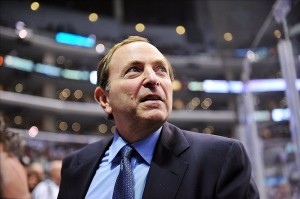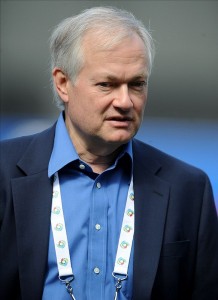It’s that eerily similar phrase we know we’ve heard somewhere before. When Gary Bettman comes out and says, “We’ve given it our best shot,” referring to the offer from himself and the board of governors, we start to sense trouble.
Bettman used the phrase back in 2005 shortly before cancelling the season. Will the season be cancelled this time? Still would say it’s unlikely, but we won’t know for a bit. And the chances are probably higher than they ever should have been for this particular round of CBA negotiations. The NHL has a lot more to lose in 2012-13 than they did in 2004-05 in cancelling a season. Their sponsorship base has grown, revenue has grown yearly and they have a paying television broadcast partner in the United States now. Needless to say, their sponsors and broadcast partners are none too happy with what is going on right now.

Coming out in mid-October or early November with a statement about an offer being your “best shot” just reeks of a gun-to-your-head negotiating style. That doesn’t work when you’re trying to hammer out a deal and forge a partnership with the players. When you look at the NHL, there is probably more resentment and bad blood between the players and Gary Bettman than in any other sport and their commissioner because of the way he carries himself.
The way you can tell is because even when there’s labor peace, whenever the subject of Bettman is brought up many players cringe and rarely have anything nice to say outside of some compliments for their individual team owners.
Beyond Bettman’s comments about “best shot” offers, there are other reasons to feel a little pessimistic as of late. Even though the sides are meeting quite often, they don’t appear to be close on core issues. NHLPA executive director Donald Fehr has a lot of a pride. This is a man who came out on the better end of all of the CBA negotiations between the MLB and MLBPA while he was representing baseball players. If the players do not come to him in an overwhelming majority saying they want to play for one of the owners’ offers, he will not cave. The players are probably unlikely to do that in any significant amount. They are one of the most united if not the most united unions in all of sports.
The NHL has made it clear they want an immediate rollback to a 50/50 split in revenue. Another sticking point here is the only way to get down to a lower cap number that a 50/50 split would cause would be a massive rollback on salaries similar to 2005 or an amnesty clause similar to the one the NBA implemented after their latest CBA deal. Clearly it isn’t fair to ask the players to give back 20% of the contracts they negotiated in good faith as recently as a day before the lockout. They did that last time. There were no guns to the heads of the owners and general managers to sign Zach Parise, Ryan Suter, and Shea Weber to massive deals right before the end of the CBA.
Also, there’s a big difference between the rollback they had in 2005 and the potential rollback the NHL wants for 2012. The difference is a lot more players have signed contracts recently than they did at the end of the CBA in 2004. In 2004 the ownership was frightened to sign players before the end of the expiring CBA. In 2012 it appeared GM’s were rushing to sign players under the old framework.

The CBA that ran from 2005-12 is the deal the owners wanted. It was signed after the season was cancelled. The players share of the pie was linked directly to revenues. In the mind of the owners at the time, that CBA deal was better than the $45 million cap that was not linked to revenues that the players had offered a week or two prior. The cap was set at under $40 million. The NHL revenue then grew a lot faster than people expected and the salary cap upper limit grew almost 80% over that 7-year term. Is it the “greedy players” fault? Of course not. Revenues just performed a lot better than expected.
So, seeing all that the players did and sacrificed last time virtually agreeing to the framework and plans the owners themselves created in 2005 after cancelling the season, the owners needed to come up with a ‘best shot’ offer to prepare for the players to continue labor peace and have a great 2012-13 season. Was it increased revenue sharing so the owners could help out their buddies on the struggling lower market teams? Was it an internal discussion about budget spending and not necessarily needing to reach the cap ceiling in every market? While we can’t say for sure, it sure looks like they just want the players to have another massive rollback and sacrifice in some form to stop the bleeding for the struggling markets, while the big market teams hang on to most of their earnings.
While no one is innocent in CBA negotiations, the NHL and their leaders are proving once again what they proved in 2005. They are not like the NBA and NFL owners. They do not understand the damage of a lost season and angered sponsors. They are willing to take the fans for granted and think they’ll be back. Once again, sadly, the NHL has proven that their ‘best shot’ just isn’t good enough.
How about you assholes drop the price a ticket first!
Karen obviously didn’t actually read this article, the players already made their sacrifice. It’s time for the owners to stop blaming the players and start blaming themselves for their financial woes. The players aren’t saints, but they have at least negotiatied in good faith. The owners are being greedy assholes
I don’t call their situation “woeful”. Omg, you can’t buy that second home in St. Barts? Boo hoo hoo.
I don’t call their situation “woeful”. Omg, you can’t buy that second home in St. Barts? Boo hoo hoo.
Declaring woe in a millionaires vs billionaires fight is pretty silly.
The players are mostly millionaire employees and should settle for what they can get. Last time they wouldn’t accept the salary cap and lost one year of salaries, fools. Seven years later and they are still being paid gobs of money and they won’t settle, idiots. They are way too caught up in the details and should be looking at the big picture, namely big, big income and now lost pay cheques, dolts. Give the owners what they want and get back to collecting those fat pay cheques and play hockey, arseholes.
Perhaps the best outcome for the game of hockey is for the NHL to fold, and a new league to eventually replace it. For now, the players will just go to Europe.
Great idea – we covered something along those lines recently. https://thehockeywriters.com/it-is-time-for-a-new-league-to-rival-the-nhl/